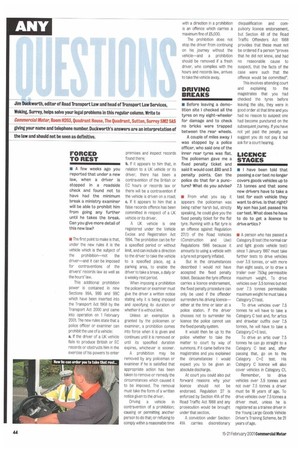FORCED TO REST
Page 46

If you've noticed an error in this article please click here to report it so we can fix it.
• A few weeks ago you reported that under a new law, when a driver is stopped in a roadside check and found not to have had the minimum break a ministry examiner will be able to prohibit him from going any further until he takes the break. Can you give more detail of this new law?
• The first point to make is that, under the new rules it is the vehicle which is the subject of the prohibition—not the driver—and it can be imposed for contraventions of the drivers' records law as well as the hours' law.
This additional prohibition power is contained in new Sections 99A, 99B and 99C which have been inserted into the Transport Act 1968 by the Transport Act 2000 and came into operation on 1 February 2001. The new rules state that a police officer or examiner can prohibit the use of a vehicle: a. If the driver of a UK vehicle fails to produce British or EC records or obstructs him in the exercise of his powers to enter premises and inspect records found there; b. If it appears to him that, in relation to a UK vehicle or its driver, there has been a contravention of the British or EC hours or records law or there will be a contravention if the vehicle is driven on a road; c. If it appears to him that a false records offence has been committed in respect of a UK vehicle or its driver.
A UK vehicle is one registered under the Vehicle Excise and Registration Act 1994. The prohibition can be for a specified period or without limit, and can include a direction to the driver to take the vehicle to a specified place, eg a parking area, to enable the driver to take a break, a daily or a weekly rest period.
When imposing a prohibition the policeman or examiner must give the driver a written notice stating why it is being imposed and specifying its duration or whether it is without limit.
Unless an exemption is granted by the policemen or examiner, a prohibition comes into force when it is given and continues until it is removed or until its specified duration expires, whichever is sooner.
A prohibition may be removed by any policeman or examiner if he is satisfied that appropriate action has been taken to remove or remedy the circumstances which caused it to be imposed. The removal must take the form of a written notice given to the driver.
Driving a vehicle in contravention of a prohibition; causing or permitting another person to do that; or refusing to comply within a reasonable time with a direction in a prohibition is an offence which carries a maximum fine of .5,000.
The prohibition does not stop the driver from continuing on his journey without the vehicle—and a prohibition should be removed if a fresh driver, who complies with the hours and records law, arrives to take the vehicle away.




































































































